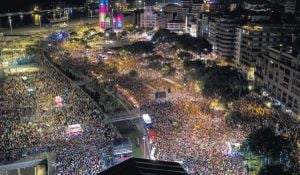The recent match between F.C. Hansa Rostock and SG Dynamo Dresden was marred by severe disturbances among fans, leading to delays and warnings from authorities. The altercations erupted during halftime of the pivotal Drittliga match, where Hansa Rostock came out victorious with a 1-0 win, thanks to early goalscorer Nils Fröling.
Fans from both sides clashed violently, as reports indicate. The police reported confrontations sparked by Dynamo fans unfurling an unauthorized banner. David Fischer, the communications manager for Dynamo Dresden, spoke on the issue after the match, highlighting the aggressive acts aimed at their supporters: "Ein derartig aggressiver und gezielter Angriff auf unsere Fans ist in keiner Weise verständlich und für uns nicht hinnehmbar. Wenn Menschen gezielt andere Personen mit Feuerwerkskörpern attackieren..." He strongly condemned the mishaps on the ground and stated it shows failure on the part of security measures, noting earlier incidents where their players were even targeted during warm-ups with flares.
The intensity of the clashes prompted referee Tom Bauer to suspend the match for approximately 45 minutes, as neither side could safely continue. "Der Auslöser ging klar von den Gästefans aus, in dem Block ist kein Stein mehr auf dem anderen," Jürgen Wehlend, the chairman of Hansa Rostock, mentioned, expressing his dismay over the violent scenes and the impact on the match's integrity. He voicing his frustration over the scenes witnessed, said, "Das Sportliche tritt natürlich in den Hintergrund. Es kotzt einen an, solche Bilder zu sehen."
During the disruption, firecrackers were thrown onto the pitch and at opposing fans, leading to injuries, particularly on the Dresden side. A full-scale riot ensued, prompting law enforcement to intervene by removing the banner and restoring order. The mood became heated as players and officials attempted to calm the situation, but the chaotic environment persisted.
Beyond the physical altercations, the match remains a dark cloud for Dynamo Dresden, who missed the opportunity to seize the top of the league table, falling short against Hansa Rostock. They had entered the match with ambitions of elevin at the first-place slot, but the defeat coupled with the riot is likely to leave lasting strains.
Once the chaos subsided and the match resumed, the atmosphere remained tense, with officials urging fans through the stadium speakers to refrain from provocations. The game continued, and both teams battled for composure in the wild environment created by their passionate yet unruly supporters. A similar lack of discipline by fans had also echoed earlier within the league's reputation, exposing vulnerabilities to team management and sports authorities.
With the conclusion of the game, Fischer and Wehlend expressed their sentiments for the injured parties, wishing them swift recoveries and advocating for future safety measures. The narrative of how the match was overshadowed by chaos highlights the Wolverines of football fan culture and the challenges clubs face to maintain decorum among fervent supporters.
Both clubs are expected to reflect on this incident and assess security protocols to avoid future occurrences. With violence tainting the spirit of competition, it’s imperative for football organizations to confront these issues head-on and reconsider how they engage with their fan base to prevent such divisive scenes.
While Hansa Rostock celebrated their hard-fought victory and the first home win against Dresden after 14 years, the overarching memory of the day will be the violent outbursts and the urgent calls for improved management of fan behavior. Due to these events, public confidence and enjoyment of the game have been brought under scrutiny, pushing for reforms within local football governance.



